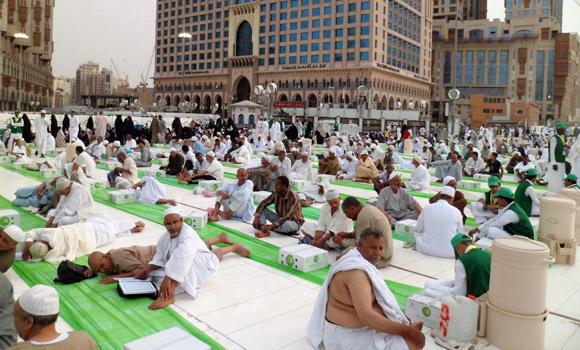Saudi Gazette report
RIYADH — Despite the happiness expressed by all with the advent of the holy month of Ramadan, people are wondering how they will be able to fast for 15 hours in soaring temperatures sometimes reaching 50 degrees Celsius, Al-Riyadh daily reported.
Fasting is beneficial for the body. It activates the fasting person’s immune system. It is also a great treatment for the body and soul, especially amid the rise in temperatures. However, one ought to implement some precautions, like drinking a lot of water and fresh juices during the hours following Iftar (breakfast). One should not hurry in consuming food, no matter how hungry and thirsty he or she is, to prevent indigestion. It is necessary to include vegetables in your meal. When fasting, it is important to add salads to your main course. It is advisable to stay indoors the whole afternoon because the heat is at its peak then. Finally, the health benefit from fasting should not be nullified by eating different kinds of food.
Abdulkareem Al-Musnid said: “Fasting during Ramadan requires some precautions to guarantee the safety of your body. It is important to consume food containing complex carbohydrates for the last meal (suhoor), like dates, vegetables and fruits. Such foods help in delaying the feeling of hunger during the day. It is also advisable to wear light cotton clothes to manage the heat.”
Salim Al-Mijlad said he goes out for shopping after Taraweeh (special night prayer in Ramadan) and stays at home throughout the day. He added that he exercises to safeguard his health because this helps the fasting person remain fit and prevents him from feeling lazy.
Hasna Al-Shihri, who is in her 50s, said: “I am suffering from chronic heart disease, high blood pressure and diabetes. Therefore, my health condition and age don’t help me fast in Riyadh, so I spend Ramadan in the southern part of the Kingdom, as it has a cooler climate and beautiful scenery. These factors help me fast during Ramadan without facing any health problems.”
Fouziyah Al-Shaibani, a teacher, said: “I have no problem with the rise in temperatures because I usually fast on Mondays and Thursdays every week as well as the 13th, 14th and 15th of every Islamic month. Therefore, the seasons of the year pass with their different rites without me facing any problems.”
Ibtisam Al-Harbi, a private sector employee, said: “There is no solution for the hot climate except to get acclimatized. I purchase my Ramadan needs in the afternoon after finishing work.”
Mirvat Ahmed, a doctor, said: “A fasting person must consume moderate quantities of sweets, preferably dates. Also, one should take proteins and vegetables as they contain fibers and avoid taking large quantities of fats. The focus should be on natural vitamins and minerals. Aside from taking a lot of vegetables, fruits and grains, one should drink balanced quantities of water at intervals to prevent indigestion. This helps the body get rid of accumulating toxins.”
She said people suffering from diabetes should consult their doctor before attempting to fast because there are cases of diabetics who can fast safely by following certain instructions. “Also, there are cases that must not fast due to fear of serious health complications.”
Dr. Haya Al-Mazyad, head of the Clinical Social Service Department at King Saud University, stressed the need to eat grilled food instead of fried food to avoid the dangers of cholesterol. She said one could eat unsalted nuts to provide the body with anti-oxidants and beneficial fats. One should reduce taking sweets as much as possible.
She stressed the need to drink green tea with mint or mint tea as they are relaxing agents. Also, one should drink sufficient quantities of water after iftar.

